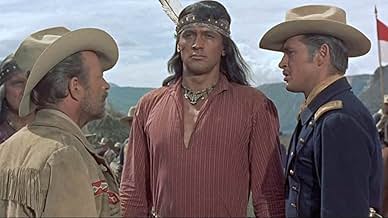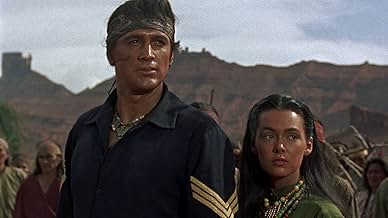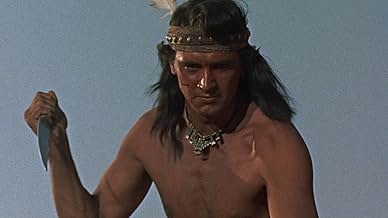IMDb रेटिंग
5.6/10
1.1 हज़ार
आपकी रेटिंग
जब अपाचे प्रमुख कोचिस की मृत्यु हो जाती है, तो चिरिकहुआ अपाचे कोचिस के शांतिप्रिय बेटे ताज़ा के बाद और युद्ध के पाखण्डी अपाचे योद्धा गेरोनिमो के पीछे फटे हुए हैं.जब अपाचे प्रमुख कोचिस की मृत्यु हो जाती है, तो चिरिकहुआ अपाचे कोचिस के शांतिप्रिय बेटे ताज़ा के बाद और युद्ध के पाखण्डी अपाचे योद्धा गेरोनिमो के पीछे फटे हुए हैं.जब अपाचे प्रमुख कोचिस की मृत्यु हो जाती है, तो चिरिकहुआ अपाचे कोचिस के शांतिप्रिय बेटे ताज़ा के बाद और युद्ध के पाखण्डी अपाचे योद्धा गेरोनिमो के पीछे फटे हुए हैं.
Rex Reason
- Naiche
- (as Bart Roberts)
Eugene Iglesias
- Chato
- (as Gene Iglesias)
Richard H. Cutting
- Cy Hegan
- (as Richard Cutting)
Bradford Jackson
- Lt. Richards
- (as Brad Jackson)
Seth Bigman
- Indian Man
- (बिना क्रेडिट के)
फ़ीचर्ड समीक्षाएं
When Cochise (played briefly by an uncredited Jeff Chandler) dies, his son Taza (played by Rock Hudson) takes over as chief of the Chiricahua Apaches and tries to maintain the peace. Followers of Geronimo wish to start fighting again.
It's a thoughtful script, and director Douglas Sirk claimed it was his favorite of his movies; he had always wanted to make a western. There are some issues with the movie, some caused by technical issues, and most by Rock Hudson's rather wooden acting. He's got two settings, thoughtful and angry, and that performance makes him, as the central character, seem rather stupid, especially given the more nuanced performances afforded the men playing cavalrymen.
The technical issues can be understood by knowing this was originally shot for 3-D, but released in a flat version. The compositions meant to showcase the depth of shot stick out like a sore thumb, lending a peculiarly film noir look to them. While Russel Metty's camerawork is exemplary in the big-screen shots of Utah, many of the more intimate scenes show up in a peculiarly dark and grey light.
The script by George Zuckerman keeps things moving along, but the problems of performance and camerawork lay heavily on this movie. Sirk and producer Ross Hunter abandoned the western for a series of glossy soap operas.
It's a thoughtful script, and director Douglas Sirk claimed it was his favorite of his movies; he had always wanted to make a western. There are some issues with the movie, some caused by technical issues, and most by Rock Hudson's rather wooden acting. He's got two settings, thoughtful and angry, and that performance makes him, as the central character, seem rather stupid, especially given the more nuanced performances afforded the men playing cavalrymen.
The technical issues can be understood by knowing this was originally shot for 3-D, but released in a flat version. The compositions meant to showcase the depth of shot stick out like a sore thumb, lending a peculiarly film noir look to them. While Russel Metty's camerawork is exemplary in the big-screen shots of Utah, many of the more intimate scenes show up in a peculiarly dark and grey light.
The script by George Zuckerman keeps things moving along, but the problems of performance and camerawork lay heavily on this movie. Sirk and producer Ross Hunter abandoned the western for a series of glossy soap operas.
Don't get me wrong.I've always been a big fan of Deltlef Sierck (Douglas Sirk in America)and most of his melodramas are among my all time favorites : "A time to live and a time to die ","All that Heaven allows" "Magnificent obsession" " Tarnished angels" "Written on the wind" plus those with Zarah Leander in Germany not to forget his final effort ,the remake of "imitation of life".
THis remake was drastically different from Stahl's version:the black servant Delilah became Annie and the only thing she could expect in life was a beautiful funeral.In Stahl's version (and in Fannie Hurst's novel) she was a businesswoman's associate ,in Sirk's screenplay she stayed the good servant -not very far away from GWTW's Mamma-who knew her place.
Still with me?I do think that,in spite of Sirk's storyteller qualities and good scenes (the discovery of the bruises on Barbara Rush's back),"Taza" is also a reactionary work .Taza (who in real life died of pneumonia two years after his dad)predates Annie in "Imitation" :he is the good Indian,who knows his place ,who (this is amazing) dresses like them ,who rebels against his people's customs and even fights them;on the other hand ,Geronimo (and his allies) plays the role of the villain : "we were hunters, warriors,we won't be breeders ".After all ,the white men are taking their land and sending them to reservations:his rebellion makes sense.
Rock Hudson,who was Sirk's favorite actor (his best parts were certainly "All that Heaven allows" and "Magnificent Obsession" -another remake of a Stahl's work-) ,is not well cast as an Indian.And what about Barbara Rush as a squaw?Debra Paget was acceptable ("Broken Arrow"),she is not.
THis remake was drastically different from Stahl's version:the black servant Delilah became Annie and the only thing she could expect in life was a beautiful funeral.In Stahl's version (and in Fannie Hurst's novel) she was a businesswoman's associate ,in Sirk's screenplay she stayed the good servant -not very far away from GWTW's Mamma-who knew her place.
Still with me?I do think that,in spite of Sirk's storyteller qualities and good scenes (the discovery of the bruises on Barbara Rush's back),"Taza" is also a reactionary work .Taza (who in real life died of pneumonia two years after his dad)predates Annie in "Imitation" :he is the good Indian,who knows his place ,who (this is amazing) dresses like them ,who rebels against his people's customs and even fights them;on the other hand ,Geronimo (and his allies) plays the role of the villain : "we were hunters, warriors,we won't be breeders ".After all ,the white men are taking their land and sending them to reservations:his rebellion makes sense.
Rock Hudson,who was Sirk's favorite actor (his best parts were certainly "All that Heaven allows" and "Magnificent Obsession" -another remake of a Stahl's work-) ,is not well cast as an Indian.And what about Barbara Rush as a squaw?Debra Paget was acceptable ("Broken Arrow"),she is not.
Maybe someone knows something more about this: I once read part of an interview with Rock Hudson in which he said that Taza, Son of Cochise was "one of the great tongue-in-cheek westerns of all time." He didn't pursue the pint, so I'm not sure what it is that's tongue-in-cheek about the film. However, Hudson did say that he and Sirk and company had a great time making it. I'd love to find a video of this seldom-seen film and check it out, but perhaps someone has an inkling?
This movie is well-famed and Rock Hudson looked great ( as he always did even to non-gay men). The long hair and darkened skin make him an awesome looking Indian. His Features are White but this was more often the case in Hollywood movies about Indians than roles of Indians played by real Indians. It is Ironic that Taza's son became an actor and acted in early westerns.. I learned this fact by IMDb. I shall use it in my future writing.
No-- It took 45 yrs to force Geronimo to Surrender and his legend is founded largely on the fact that he was never caught but due to many of his own warriors becoming scouts, he was forced to surrender. It is sad but in a very harsh way--just punishment that these scouts were stripped of their roles as Scouts and sent to the same prison where Geronimo was. They served much longer sentences than what they were given. This is yet another unfairness done to the APACHE and to Geronimo. Who died in his mid-eighties from alcoholism and from falling from his horse on the way home from a saloon. HE wound up in a irrigation ditch all night and caught pneumonia as a result and died shortly after. Not a fitting end for a man that could raise the back of the hair on many a settler and many a cavalry soldier who had to think about his chances of surviving a battle with him.
He almost beat the US army--but alcoholism is a disease that killed far more Indians than cavalry soldiers ever did. The Native American had NO time in their history to develop a resistance to the effects of alcohol---both the immediate effects and the long-term effects shortened the lives of most Native Americans who drank it.
In the much later movie GERONIMO starring Gene Hackman and Robert Duvall, the camera takes us on the long train ride to Florida in the end of the movie. Some Apaches who did not become traitors to Geronimo were being chastised by loyal warriors and Geronimo reminds them that they are so few that it would be good for them to learn to get a long- -he reminds them that all they have is each other.
Geronimo was a name that leaps off of the pages even now--- but in his lifetime-- anything written about him was read immediately because it was usually news about his ongoing exploits. It is very sad that they allow the mistake of saying that he was captured to be stated as truth among his own people. Because the fact that he was not captured or killed even though the forces used to find and arrest or kill him were massive, is a testimonial to the skill of the Apache and to Geronimo himself. I believe the final number that surrendered was under 100. However, I would not want to be a settler and live anywhere Near where that 100 Apache were running free. They were intelligent, skilled warriors and Geronimo has been called a tactical genius. Since he was NEVER captured-- that must be true.
I must clarify: I do not believe that Geronimo Was EVER actually Captured-- He did surrender twice and after the second surrender, he was sent to prison in Florida. He was treated with respect by white soldiers with high level rank and other Apache though that respect from White Generals did deteriorate, he was NEVER just dismissed by his peers. This movie shows that happening again and again. This is tragic for the Apache was never really conquered and to say that he was, cheats him of the truth. Entire Armies were sent against them but they were NOT actually beaten in the common sense of the word. IF I was an Apache-- I would want that fact to remain clear and would be angered by a sloppy screenplay from Hollywood that disputes the truth of the Apache's wartime accomplishments. They have never been equalled.
Warren E.Justice
No-- It took 45 yrs to force Geronimo to Surrender and his legend is founded largely on the fact that he was never caught but due to many of his own warriors becoming scouts, he was forced to surrender. It is sad but in a very harsh way--just punishment that these scouts were stripped of their roles as Scouts and sent to the same prison where Geronimo was. They served much longer sentences than what they were given. This is yet another unfairness done to the APACHE and to Geronimo. Who died in his mid-eighties from alcoholism and from falling from his horse on the way home from a saloon. HE wound up in a irrigation ditch all night and caught pneumonia as a result and died shortly after. Not a fitting end for a man that could raise the back of the hair on many a settler and many a cavalry soldier who had to think about his chances of surviving a battle with him.
He almost beat the US army--but alcoholism is a disease that killed far more Indians than cavalry soldiers ever did. The Native American had NO time in their history to develop a resistance to the effects of alcohol---both the immediate effects and the long-term effects shortened the lives of most Native Americans who drank it.
In the much later movie GERONIMO starring Gene Hackman and Robert Duvall, the camera takes us on the long train ride to Florida in the end of the movie. Some Apaches who did not become traitors to Geronimo were being chastised by loyal warriors and Geronimo reminds them that they are so few that it would be good for them to learn to get a long- -he reminds them that all they have is each other.
Geronimo was a name that leaps off of the pages even now--- but in his lifetime-- anything written about him was read immediately because it was usually news about his ongoing exploits. It is very sad that they allow the mistake of saying that he was captured to be stated as truth among his own people. Because the fact that he was not captured or killed even though the forces used to find and arrest or kill him were massive, is a testimonial to the skill of the Apache and to Geronimo himself. I believe the final number that surrendered was under 100. However, I would not want to be a settler and live anywhere Near where that 100 Apache were running free. They were intelligent, skilled warriors and Geronimo has been called a tactical genius. Since he was NEVER captured-- that must be true.
I must clarify: I do not believe that Geronimo Was EVER actually Captured-- He did surrender twice and after the second surrender, he was sent to prison in Florida. He was treated with respect by white soldiers with high level rank and other Apache though that respect from White Generals did deteriorate, he was NEVER just dismissed by his peers. This movie shows that happening again and again. This is tragic for the Apache was never really conquered and to say that he was, cheats him of the truth. Entire Armies were sent against them but they were NOT actually beaten in the common sense of the word. IF I was an Apache-- I would want that fact to remain clear and would be angered by a sloppy screenplay from Hollywood that disputes the truth of the Apache's wartime accomplishments. They have never been equalled.
Warren E.Justice
Beware folks, because you deal here with the only western that director Douglas Sirk will ever give to us. But he has for this western his fetish actor Rock Hudson, so he is not totally alone in unknown territory. This is an agreeable piece of work, not worse nor better than other Universal westerns of this period. George Sherman could have done it too, and in the very same manner. By chance, Jeff Chandler, who played Cochise in THE BROKEN ARROW - for Twentieth Century Fox - was in the meantime "transfered" to Universal Studios, so it was easy for the production to use him as a dying Cochise in the beginning. And this is not a spoiler !!!!! Rock Hudson is OK, it also could have been worse. Good western.
क्या आपको पता है
- ट्रिवियाDouglas Sirk often cited this film as the favorite of his own films since he always wanted to make a Western.
- गूफ़The official U.S. flag of 1872, the year the story takes place, did have 37 stars in five rows, however it consisted of a top and bottom row of eight stars with three rows of seven stars in between (8-7-7-7-8), not alternating rows of seven and eight (7-8-7-8-7) as the one in the film has.
- कनेक्शनFeatured in Rock Hudson's Home Movies (1992)
टॉप पसंद
रेटिंग देने के लिए साइन-इन करें और वैयक्तिकृत सुझावों के लिए वॉचलिस्ट करें
- How long is Taza, Son of Cochise?Alexa द्वारा संचालित
विवरण
- रिलीज़ की तारीख़
- कंट्री ऑफ़ ओरिजिन
- भाषाएं
- इस रूप में भी जाना जाता है
- Son of Cochise
- फ़िल्माने की जगहें
- Devils Garden, Arches National Park, यूटा, संयुक्त राज्य अमेरिका(cavalry ambush scene)
- उत्पादन कंपनी
- IMDbPro पर और कंपनी क्रेडिट देखें
- चलने की अवधि1 घंटा 19 मिनट
- पक्ष अनुपात
- 2.00 : 1
इस पेज में योगदान दें
किसी बदलाव का सुझाव दें या अनुपलब्ध कॉन्टेंट जोड़ें




































